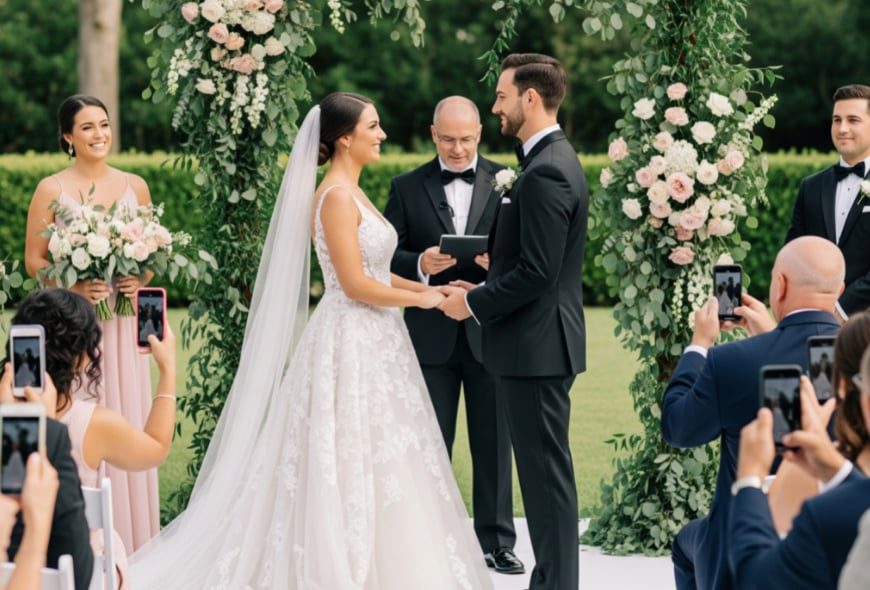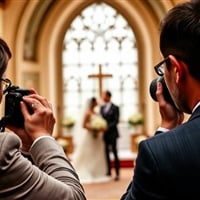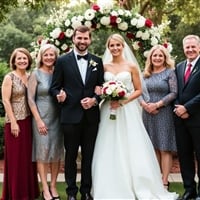
In an age where capturing the perfect moment often takes precedence over experiencing it, many couples are choosing to implement "unplugged" ceremonies—asking guests to switch off their phones and cameras during the wedding. This growing trend reflects a desire to create more intimate, present moments whilst ensuring professional photographers can work without obstruction. However, like any wedding decision, going unplugged comes with both compelling advantages and potential drawbacks that couples should carefully consider.
What Is an Unplugged Wedding?
An unplugged wedding is a ceremony where couples request that guests refrain from using mobile phones, tablets, cameras, or other electronic devices during specific portions of the celebration—typically the ceremony itself, though some extend this to the entire reception. Rather than guests viewing the proceedings through their screens whilst simultaneously photographing or filming, an unplugged approach encourages everyone to be fully present and engaged in witnessing the couple's special moment.
The concept gained popularity as couples noticed their ceremony photos filled with guests holding up phones and tablets, creating a digital barrier between themselves and their loved ones during one of life's most significant moments.
The Case for Going Unplugged
Enhanced Intimacy and Connection
When guests aren't preoccupied with capturing content for social media or their personal archives, they become more emotionally invested in the ceremony. Eye contact increases, genuine smiles replace forced poses, and the energy in the room shifts towards collective presence rather than individual documentation. Many couples report feeling more connected to their guests during unplugged ceremonies, as everyone's attention is genuinely focused on the couple rather than divided between the moment and their devices.
Professional Photography Without Interference
Wedding photographers consistently advocate for unplugged ceremonies because guest devices can significantly interfere with their work. Phone screens create harsh lighting in otherwise carefully orchestrated shots, guests stepping into aisles for better angles can block professional photographers' sight lines, and the general distraction of multiple devices can detract from the ceremony's visual appeal.
Professional photographers are hired specifically to capture these precious moments with proper equipment, lighting, and expertise. When guests attempt to photograph simultaneously, they often inadvertently compromise the quality of professional shots that couples will treasure for decades.
Avoiding Social Media Spoilers
An unplugged ceremony ensures that couples maintain control over how and when their wedding moments are shared publicly. This prevents guests from posting photos or videos to social media before the couple has had a chance to share their own carefully selected images, maintaining the surprise for friends and family who couldn't attend.
Creating Sacred Space
Many couples view their wedding ceremony as a sacred, once-in-a-lifetime moment that deserves undivided attention. The absence of devices can create a more reverent atmosphere, allowing the ceremony's emotional weight to be fully felt by everyone present. This approach often results in more meaningful, memorable experiences for both the couple and their guests.
The Arguments Against Unplugged Weddings
Limited Personal Documentation
Guests often want to capture their own memories of the special day, particularly elderly relatives or family members who live far away and may not have many opportunities to gather with extended family. Personal photos and videos can hold different sentimental value than professional shots, capturing candid moments, personal perspectives, and spontaneous reactions that professional photographers might miss.
Generational and Cultural Considerations
For some guests, particularly younger generations, photographing and sharing special moments is an integral part of how they experience and process events. Asking them to completely disconnect might feel restrictive or unwelcoming. Additionally, certain cultural traditions involve family members taking specific photographs or videos as part of their celebration customs.
Sharing with Absent Loved Ones
In today's interconnected world, many families are geographically dispersed. Guests often serve as informal documentarians for family members who cannot attend, immediately sharing photos and videos to include distant relatives in the celebration. An unplugged policy can make it more difficult to include these absent loved ones in real-time.
Enforcement Challenges
Implementing an unplugged policy requires clear communication and sometimes uncomfortable conversations with guests who forget or choose to ignore the request. Some couples worry about the awkwardness of having to remind guests during the ceremony or designating someone to monitor compliance.
Finding the Right Balance
Partial Unplugging
Many couples choose a compromise approach, asking guests to refrain from devices only during the ceremony whilst allowing photography during the reception, cocktail hour, or other celebrations. This preserves the intimacy of the most significant moments whilst still allowing guests to capture and share their own memories of the broader celebration.
Clear Communication Strategies
Successful unplugged weddings require clear, polite communication through multiple channels. Couples often include requests on their wedding websites, ceremony programmes, and through announcements by the officiant. The key is framing the request positively—emphasising the desire for shared presence rather than restrictions on behaviour.
Professional Coverage Guarantees
Some couples address guests' documentation concerns by guaranteeing that professional photos will be shared quickly after the wedding, sometimes within 24-48 hours for a preview gallery. This reassures guests that memories will be captured and made available, reducing their impulse to document everything personally.
Making the Decision
The choice to have an unplugged wedding ultimately depends on a couple's priorities, their guest list, and their vision for their special day. Couples who value intimacy, professional photography, and present-moment awareness often find unplugged ceremonies deeply rewarding. Those with tech-savvy guests, large extended families, or cultural traditions involving personal documentation might prefer a more flexible approach.
Consider your guest demographics, the importance of professional photography in your budget, and how you envision experiencing your ceremony. Remember that this decision isn't all-or-nothing—many couples successfully implement modified versions that respect both their desires for presence and their guests' wishes to capture memories.
The most important factor is ensuring that whatever approach you choose aligns with your values and enhances rather than detracts from your celebration. Whether fully unplugged, partially restricted, or completely open to devices, the goal remains the same: creating meaningful, memorable moments that you and your guests will treasure for years to come.
Check out our amazing Photographers HERE


